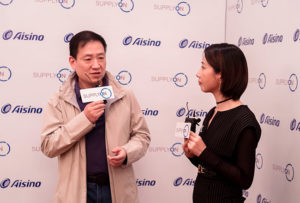Inspirations and innovations for the financial transformation of the automotive industry in China
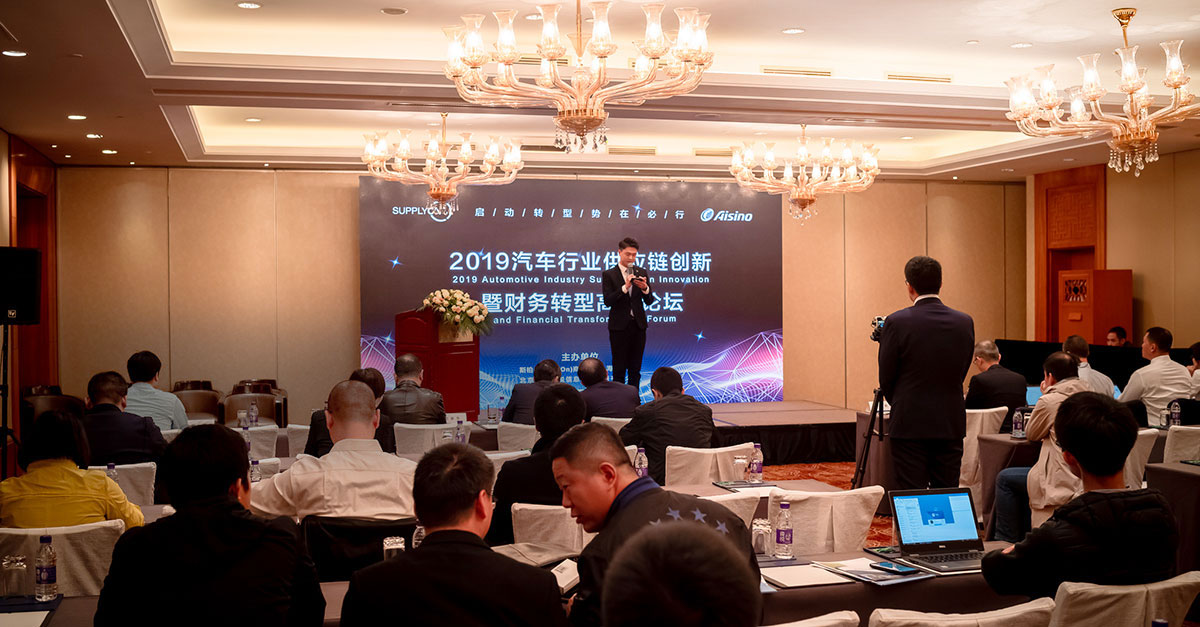
Outside, a constant stream of vehicles and cold temperatures prevailed; inside, innovations in the automotive industry were debated in a warm atmosphere. That was the “2019 Automotive Industry Supply Chain Innovation and Financial Transformation Forum”, which took place in Beijing on October 25, 2019.
The event was organized by SupplyOn together with the Chinese IT security expert Aisino. Both had invited managers and experts from the automotive industry to discuss topics relating to innovation, the transformation of financial processes, artificial intelligence and blockchain applications. The top-class participants included representatives from Hyundai, Mercedes Benz, BAIC, Siemens and Geely.
Launch of the Golden Tax solution from SupplyOn and Aisino
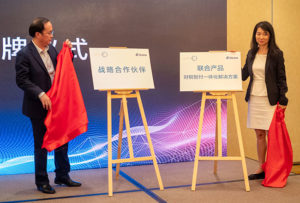
In her opening speech, Zheng Zixi, Managing Director of SupplyOn China, announced the launch of the joint Golden Tax solution with Aisino. In 2017, national tax audit regulations were introduced with far-reaching implications for financial and information management as well as business processes in companies. “This forum provides new ideas and solutions exactly for this,” explained Cheng Hongbo, Assistant Managing Director of Aisino.
At the launch ceremony, Xia Jiakun, Senior Product Consultant at SupplyOn, and Cui Yankuan, Sales Manager at Aisino, presented the joint GTS solution in detail. Based on the issues occurring in the existing invoicing process, they explained the functions and benefits of the new solution.
Later, the participants had the opportunity to experience “smart payment” live during an interactive product demonstration.
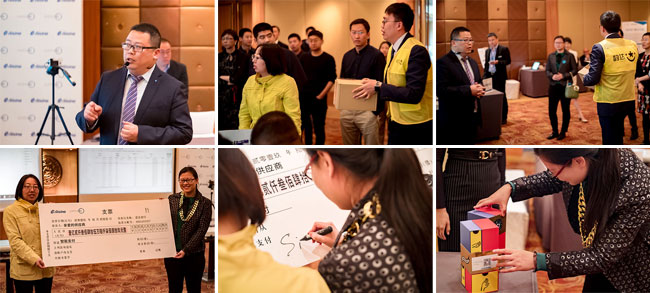
Strong prelude to an inspiring event
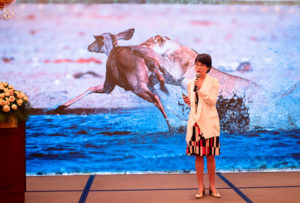
Xiao Ying, Consulting Director at SupplyOn, presented the opening speech of the main part of the event. She started with the proverb about the lions and the gazelles – for both they have to be faster than the other to survive. In this context, she also quoted the well-known British logistics expert Martin Christopher with the words: “In the 21st century, competition is no longer between stand-alone companies, but rather supply chain against supply chain.”
From 1.0 to 4.0, they all have the same goal: “to improve the efficiency of the flow of money, goods and information in the supply chain,” she says. In her view, Supply Chain 4.0 = application of best practice + network ecosystem + artificial intelligence. This is well evidenced by Alibaba, SupplyOn customer projects, a PwC industry study and other sources.
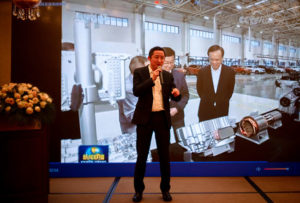
Huang Lei, Vice President at Sokon, and Lui Yusheng, Head of the ‘Sokon Automotive Intelligent Manufacturing Project’ demonstrated what such an intelligent supply chain can look like in practice. Both presented the new digital intelligent planning and supply chain of the Sokon New Energy Automobile Purchasing Center. Mr. Huang explains: “Sokon is building a ‘3-2-1 supply chain’ based on the principle of intelligent manufacturing. This consists of three circles, two chains and one pyramid.”
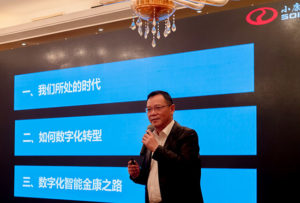
Lui adds: “The overall structure of our intelligent digital company Sokon includes three elements: information technology (IT), organisational technology (OT) and automation technology (AT)”. To explain this, he uses the human body as an analogy: OT refers to the ability to operate efficiently and thus corresponds to the brain. IT is the digital information platform – equivalent to the central nervous system. And AT describes the intelligent automatic equipment technology, which translates in this analogy into the limbs of the human body.
The financial transformation changes the role of the CFO
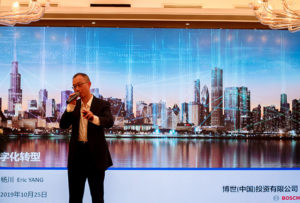
Yang Chu, Vice President Finance at Bosch, pointed out that the digital transformation requires a new role orientation for the Chief Financial Officer (CFO). He described the challenges of digitization in finance with the four elements of VUCA (volatility, uncertainty, complexity and ambiguity). As a result, he advocated digital thinking as necessity.
When it comes to digitizing the financial area, transformation is becoming increasingly important – and is also the most difficult part. It doesn’t matter whether you are a gazelle or a lion: running first is crucial. Once you run in a certain direction, inertia comes into play – no matter how fast or slow you are. But the hardest part is how to run.
Building on the new roles, strategic goals, digital empowerment and core elements of transformation, Mr. Yang explained the need for digital transformation in finance and how to implement it in the enterprise.
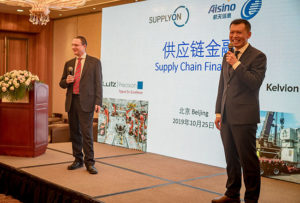
James Greener, Managing Director of Kelvion China, and Zhao Jiaxian, CFO of Lutz Hong Kong, took turns when talking about supply chain finance. In their view, there are two categories of future-proof supply chain finance solutions: First, these are solutions based on “classic supply chain finance upgrades” (Supply Chain Finance 4.0). Second, those are solutions based on blockchain technology.
Ye Gang, Senior Product Consultant at Aisino, then presented the challenges and solutions for corporate tax risks and information management.
Lively discussion on the situation in the Chinese automotive market
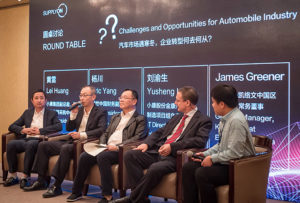
The forum concluded with an animated panel discussion on the Chinese automotive industry. Yang Chuang from Bosch, Huang Lei and Lui Yusheng from Sokon as well as James Greener from Kelvion harshly criticized the current status quo.
2018 heralded a turning point in the Chinese automotive market – from rapid growth to a sudden decline. As the world’s largest automotive market, this decline affected not only the Chinese automotive industry, but also manufacturers and suppliers worldwide. The industry is in a harsh winter, so to speak, which has led to layoffs.
However, Mr Yang and Mr Huang disagreed on this. While particularly the classic automotive industry might be experiencing a tough winter, electric vehicle (EV) manufacturers are experiencing a spring blossom. This is precisely where there is a great opportunity for the transformation of the industry.
However, classic manufacturers who are at home in the classic automotive market usually cannot quickly transform themselves. If, on the other hand, they develop new energy cars too quickly, they encounter new difficulties, because that’s not an easy task, Lui explains.
Bottom line: convincing Golden Tax solution
The event was a complete success, which is also proven by the numerous positive feedbacks. For example, Mr. Chen of Geely’s IT department stated, “In the past, each department worked for itself. Now we need to look at the problem from a company-wide perspective and integrate all systems. This places higher requirements upon our IT department. With Geely acquiring companies abroad, we look for technical support from a mature, international platform like SupplyOn.”
Mr. Chen of Beijing Automotive Sharing Center commented: “Currently, the effort for checking receipts, invoices and accounts is very high. It costs a lot of time and resources, so financial employees have to work a lot of overtime. The complete solution presented here at the Forum provides a good solution for the financial processes.”
